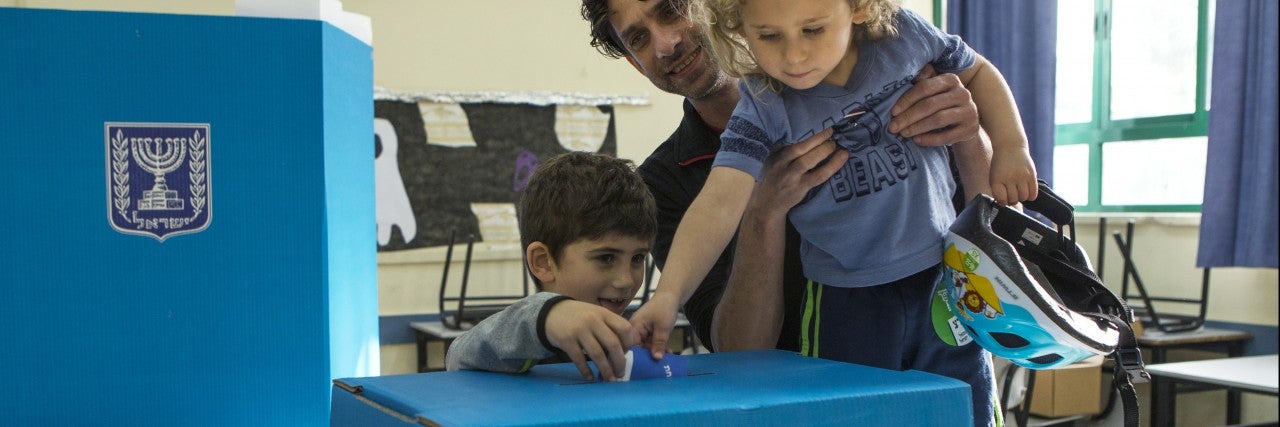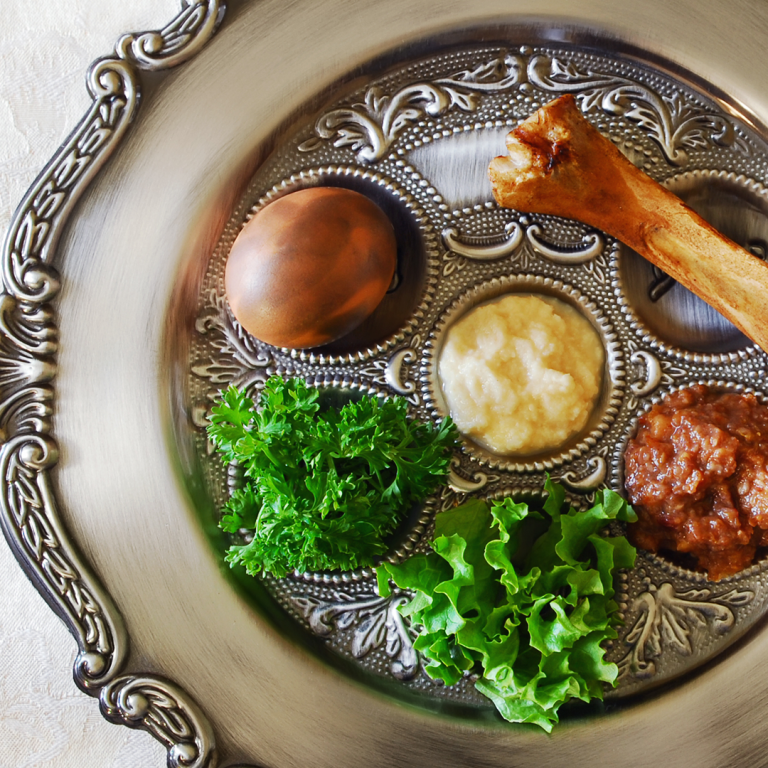March 18, 2021
Ahead of the March 23rd elections in Israel, we’re joined by Haviv Rettig Gur, The Times of Israel's senior political analyst. Gur discusses the highly polarized sentiment around Prime Minister Benjamin Netanyahu, the conflict within the Haredi community over pandemic restrictions, and the gap between the positions of the political parties that represent Arab Israelis and the concerns of Arab Israelis themselves.
Then, Dina Siegel Vann, Director of AJC's Belfer Institute for Latino and Latin American Affairs, reflects on the anniversary of the 1992 suicide bombing attack on the Israeli embassy in Buenos Aires, Argentina, which left 29 dead.
Listen to this episode on Apple Podcasts, Spotify, and Google Podcasts.
Episode Lineup:
- (00:40) Haviv Rettig Gur
- (23:16) Dina Siegel Vann
- (26:23) Manya Brachear Pashman
- (29:45) Seffi Kogen
Episode Transcript
Seffi Kogen (0:40)
We're less than one week out from elections in Israel, which will take place next Tuesday, March 23. These are the fourth national elections in Israel in the span of just two years. Through the first three rounds, the country has remained mostly deadlocked. Joining us now to help explain what we're seeing in Israeli politics, and what to expect from next week's vote is Times of Israel's senior analyst Haviv Rettig Gur. Haviv, thank you so much for joining us.
Haviv Rettig Gur (1:07)
Thanks for having me, Seffi.
Seffi Kogen (1:09)
When I try to talk about Israeli politics, I always get bogged down in the details, you know, like . . . oh, well, in order to understand what's happening now, you need to remember how big of a deal it was in February 2019, when Benny Gantz, Yair Lapid, and Gabi Ashkenazi joined up.
Or, you know, in order to understand Gantz's waning popularity, you have to examine what he could have done in April 2020, when he had the chance to seize the Knesset speakership. All those kinds of little intrigues like that which loomed large at the time, but maybe aren't critical to the story. You're great at making things simple in your journalism. So let me ask you, what's the most kind of concise, possible way you can explain how we got to now.
Haviv Rettig Gur (1:51)
How we got to now. I think it's the story of Benjamin Netanyahu. I think we are all living through the story of a man who is both one of the most successful and most loved leaders Israel has known and also one of the most unloved, genuinely disliked. And I think not unsuccessful, but I think who has created tremendous, tremendous amount of blowback in Israeli society. And that's what you're seeing now you're seeing right wingers who are caucusing essentially, unofficially, but caucusing with the left to oust Netanyahu. You're seeing strange coalitions on the right of Haredim who suddenly declaring, literally signing documents of fealty to Netanyahu. Not because the Ultra-Orthodox politicians, you know, care if he lives or dies, but because their public genuinely genuinely believes that he is their leader and represents them. It is a referendum on Netanyahu, and not in the sense of a vote. But in the sense really of a culture war over this man and over what many, many people have invested in him and see him as representing.
Seffi Kogen 2:58
You know, when we think about the political divide in America, you think of kind of extremes along an economic plane, you know, maybe from like socialist to total free market. And then you think about the social policy from, you know, maybe conservative to progressive. A lot of those social issues that are so critical here in the States, things like gun rights, abortion rights, LGBT rights. I mean, gun rights is a non-issue in Israel. LGBT still has, you know, some political currency maybe but nowhere near as, you know, much of a hotbed as it is.
Haviv Rettig Gur (3:33)
Right. It's symbolic. Liberals talk about, liberal parties talk about LGBT rights, not as a specific agenda in its own right, but as a symbol of liberal society generally. And so it's sort of a flag that you wave for other things.
Seffi Kogen (3:46)
So if you were to talk about the axes on which Israeli politics break down, I mean, you just gave us one example, right? The how you feel about Netanyahu axis that's like a very important and very real, you know . . . it's surprising, I guess, they say politics is personal, but like this is really personal. What are the other axes in Israel? You know, what are the other things that people have in mind as they go to the ballot box and choose a little slip to put in their blue envelope?
Haviv Rettig Gur (4:12)
It's a great question, because it's so very different from the United States. I just want to just add one sentence about the Netanyahu axis. There's good reason for it. In other words, Netanyahu has made himself in many ways the axis because he has consolidated power over the last 11 years in an extraordinary way. The Foreign Ministry does very little diplomacy at important strategic levels. A lot of it has been outsourced to the Mossad and other agencies that report directly to Netanyahu. The defense ministry is obviously massive and important. But when Avigdor Lieberman was defense minister a few years ago, for example, for about two years, we saw the defense minister make almost no key decision issue no serious, you know, policy statement. Netanyahu consolidated that around him. So we've seen an enormous consolidation of ministries, of political power, within the Likud party around the man and therefore the man is very important.
We now have this whole debate in Israel or whether the Mossad has become politicized, because the Mossad Chief, Yossi Cohen, appointed by Netanyahu, is both handling all of the Abraham Accords, a lot of foreign policy for him. Negotiations with Turkey, things that don't need to be, right? Intelligence are under the radar. He's overseen the massive growth in the Mossad, at least a doubling of manpower, we don't quite know because it's technically a state secret, huge growth. It's said to be the second most expensive intelligence agency in the world, after the CIA. And that's all under Netanyahu. There's been this consolidation.
And the personality of the man is what led to four elections now, because it was Netanyahu who made the decision politically, in May of 2019 to pursue a certain kind of coalition negotiation. The details don't matter, as you said, but just his own maneuvers broke that first election. May 2019, was the first time that an Israeli election ended after about seven weeks of negotiations without a government, in the history of Israel.
And Netanyahu was the one who said, Oh, let's go to a new election real quick, or Benny Gantz might have a chance to form a government. It's that kind of breaking of rules and that kind of consolidation that makes sense. If you think and while he's done that Netanyahu has made us world leaders on vaccination, and also made Israel prosperous and strong and defied Iran and all of these things, and you think it's a good thing.
Some of the profound sort of culture war issues here, as you said, abortion is just not an issue. Healthcare, we don't argue about, we just have a very good system. And by the way, if you ask ordinary Israelis, they'll tell you, I have no idea about health care, what would I know about building a healthcare, so you're telling economists to do it? And the economists don't always do it right. Our health care system is the product of at least four major rounds of real profound reform that have occurred over the last five, six decades.
Seffi Kogen (6:52)
I think the old joke in the UK is that the National Health Service is the closest thing England has to a state religion. I don't think Israelis are quite so passionate about it. They're just glad that it you know basically works, you know, even if it's a headache as often as not.
Haviv Rettig Gur (7:06)
Right, I don't mean to say this as criticism, but Israelis live longer than they should, about three years longer than Americans on average. That's just numbers on Wikipedia. If you go to Wikipedia and Google different countries' life expectancy. Israelis have life expectancy, and it's not Japan's but it's getting close to Japan, even though they have a GDP per capita which usually tracks life expectancy, way further down, around Eastern Europe and maybe Ireland, lower than Ireland. So something's working in the system and all these questions of healthcare are gone.
I think one of the profound issues that divides us is obviously religion, the Haredi the parties define themselves as a religious movement. And the left defines itself in many, many ways as secular. There are some attempts to form left wing religious parties, they tend to fizzle out pretty quickly. There's some attempts to be right wing liberal, and secular. Avigdor Lieberman is an example of that. You now have Gideon Sa'ar trying to form a Liberal Party on the right. They don't take off.
And more than that, maybe the one major divide of Israeli politics is what we Israelis tend to call tribes. We are a society deeply divided into very, very different subcultures and subgroups. Along religious lines, ethnic lines, Mizrachi, Ashkenazi, Arab, Jew, Haredi, Modern Orthodox, secular, 16 kinds of Orthodox, 16 kinds of secular. And we all have our own little political parties. Incidentally, that's how Israeli society is really built. Our politics reflect those tribes and Israelis vote along those tribes. You have towns in Israel that lean 80-90%, toward a single party. And it's because the parties really represent subcultures.
Seffi Kogen (8:46)
Haviv, let's talk about the Haredim, the Ultra-Orthodox who you brought up a moment ago. Over the past 12 months or so, really kind of over the course of the pandemic, there's been this long simmering conflict between, you know, society at large and that community, the Haredi community, which is about - I think it's about 12% of the Israeli population - that conflict has boiled over. There's been physical violence in the streets, generally, the Haredim are the ones kind of exercising the violence, and there's been extremely heated rhetoric, which has certainly come from both sides. What's the story there?
Haviv Rettig Gur (9:18)
It's a painful story, I have to start by defining terms. We have seen an enormous Haredi struggle with the social distancing rules, and with the virus generally, which has hit them much, much worse. The last figure I saw was from a month ago, but it was something like over the previous 11 months, an elderly Haredi person was three times more likely to die from the Coronavirus than an elderly non-Haredi Jewish person or even general population, including the Arabs, which also had a slightly higher rate but not quite at the Haredi level.
So they have really been hard hit. And the reason they were hard hit is the same reason that they struggled to follow social distancing rules. It hit their culture profoundly. Now, again, the defining terms, the 12% figure you cite is the entirety of Haredi culture in Israel. And that's everyone who calls themselves Haredi in polls. About half of those are Shas - Sephardi, Mizrahi Jews. Shas rabbis, Shas institutions, Mizrahi Jews did not have this struggle. You almost didn't see it.
Then they roughly performed the way generally Israelis performed which is to say they generally broke rules, but they kept them enough to have the virus, to have lockdowns, you know, work. But the rabbis said from the very beginning, we're closing the Yeshivas. We're closing the seminaries, we're obeying these rules. So that's half. And among the Ashkenazi Ultra-Orthodox, which is what you generally would think of as in America as an Ultra-Orthodox person, you have the division between the Lithuanians and the Hasidim. Now, the Lithuanians struggled and had problems and some institutions didn't close enough, but in the end, they did obey the rules. It is among the Hasidim, roughly a quarter of the population of Haredim in Israel, that you saw flagrant violations, violence in the streets, teenagers running, you know, roughshod over, you know, literally attacking police. Abus set on fire in the middle of B'nai Brak, which is generally a quiet town of hardworking people.
And really just anger and bitterness and frustration. And now in the election, incidentally, we're seeing a lot of these Hasidic groups reconsider voting for the traditional Ultra-Orthodox parties, because they feel betrayed by those parties for not defending them when they were hated by the entire country for not following social distancing rules, and essentially leading to the deaths of their own elderly, right? Why? Why did they fail so badly?
Social distancing is hard for everybody. But for certain kinds of cultures, and in Israel, it's the Ultra-Orthodox happening to fit the bill, it's much harder. They have many children. They live in small homes. They're generally poor. Largely because of social and religious choices that they make. You don't have to pity them for it. They choose that life. But they have that life. Now, when their kids spend most of their day outside the house. Because when you have eight kids, or nine kids, or 12 kids, in some cases, you have entire cities in Israel, like Beitar Illit, where the median age is 12. The median age is 12, because these are families with 10 kids - is the average family. Then you tell them Oh, by the way, schools are closed, everybody go home. Essentially, home is a place to sleep. They leave home early in the morning, they go to various kinds of schooling and social activities outside, and they come home to sleep.
Now social distance that society. Now tell them, Oh, great, you're all in lockdown, be home with your 11 kids with no television, no internet, because they don't have television, internet for religious reasons. They were shattered. They couldn't do it. It was a shock to the system. Haredim are happy people. We have incredible sociological studies of them, where they report very high levels of happiness. And then came this virus and robbed them of everything that makes Haredi life worthwhile. And turned all of the things that make Haredi life worthwhile into abject suffering, in a way that people living in a more modern world didn't experience.
Seffi Kogen (13:17)
There is kind of this sense, I think that something's got to give, right, that like, the kind of basic compact of the state, you know, the state to its citizens, the obligations of the citizens of the state, the obligation of the state to its citizens. That that's like, not working in the Haredi population right now, hasn't been for many years.
Haviv Rettig Gur (13:37)
It's worth saying that what you just said is a view shared by many Haredim, that the old way of doing things is unsustainable. And over the last 15-20 years, we've seen an enormous run toward jobs, towards schooling, the founding of Ultra-Orthodox women's colleges. And generally higher education, programs in the army to absorb Ultra-Orthodox soldiers who want to draft. So Ultra-Orthodox society as it grows too big to be sustained from the outside has also been changing. So you're absolutely right. But you know, it's been a weird year where the resentment was very high. And this all really exploded. It lead the news broadcast for months at a time during the lockdowns.
Seffi Kogen (14:16)
On a smaller scale, there is something weird going on also in the Arab sector, which is about 20% of the Israeli population. There's a small but a statistically significant chunk of that sector that appears to be moving into alignment with the Israeli right wing, which is surprising. Can you tell us about that?
Haviv Rettig Gur (14:37)
Yeah, this is another fascinating change. I think the bottom line is, this is what success looks like, for a Zionist Jewish state that's also a democracy. The Ultra-Orthodox are a success story because they are integrating. If you ever hear an Ultra-Orthodox Israeli curse, you know, at a cab driver or something, that's very Israeli culture to Israel. The same phenomenon is happening with other minorities and with Israeli Arabs.
20 years ago, we had astonishing first signals of this during the Second Intifada, when the bitterness between Jews and Palestinians was at an all time high. There were buses blowing up in Israel, there was the sense that the enormous promise of the peace process had just come crashing rivers of blood at our feet, among Israelis and Palestinians both. And then they have these polls of Israeli Arabs at the time. And they said, you know, how do you feel about being Israeli right now with so much violence between Jews and Arabs? And something like astonishing numbers, 40% said, We're proud to be Israeli. And thank God, we're Israeli, and we want to be Israeli. And that's a consistent line that we've heard since then.
There is a gap between the political parties who represent Arab Israelis, and many, many, many Arab Israelis. I'm not saying the political parties like Hadash and Balad and others who have taken up the Palestinian causes as their, essentially their primary agenda in the Knesset, that they don't represent their voters. I think they do represent their voters. But it's worth saying that they don't draw that many voters, any one of them from their community. There's a huge chunk of their community that hasn't voted, and doesn't vote. And there are some indications-we have the party now called Ra'am, which is one of the four parties that made up the Joint List over the last two elections, and in 2015-a party called Ra'am that has broken from the Joint List, from the general sort of Arab politics and said, We are no longer going to play this game where we're headlining our politics with the Palestinian cause.
So we're seeing a change that is many, many years in the making, of the desire to just belong and play the game, and have politics that are very, very simple and pragmatic. One reason I think it's coming from is that Ra'am is an Islamist party. It belongs to the broader Islamist movement in the Middle East, some of which produces terror groups. In the case of Ra'am, it's the part that does not produce terror groups, but which believes that Islam, there is a political version of Islam, which has the power to solve the political problems that have kept the Arab and Muslim world down. Kept them backward and unable to compete and develop and thrive in modern times. And so Islam is the solution.
Seffi Kogen (17:18)
It occurs to me that one thing we've hardly touched on is the left-right balance in Israel. Like in most democracies, that's what the vote tends to hinge on. But that's not really where the discourses is right now. I don't think there's anyone, any poll who expects a genuinely left of center party to get even 10% of the vote. What accounts for the disappearance of the left> And are there any prospects of it returning?
Haviv Rettig Gur (17:42)
Yeah, I'm not sure it's disappeared in the sense of substance. The people who wanted certain things still want those things, in roughly the same numbers. But the term left has been so identified with a particular view on, on the potential for peace with Palestinians, that it's become an unusable word in much of Israeli politics, people used to say, I am left in the sense that I want a two state solution, now think that that's a very silly view, just because it's not possible. They still want separation. If you ask them, Do you think separation is important for Israel's future, and for the Palestinians' future? They say yes. And then you say, Do you think it's possible? They say no. And so they don't call themselves left. But if you take everyone calling themselves center, and just decide to call them left for a minute, the balance is there. And I think that there is that gap. Just the words have changed, the terminology has changed.
Seffi Kogen (18:33)
Let's close. And let me just ask you this one last question. It might be the hardest one, or who knows, maybe it's the easiest one. Do you have any kind of prediction? When all is said and done, should we expect these fourth elections to result in the continuation of the Netanyahu premiership? Should we expect someone else at the helm of the ship of state? Should we expect more elections? What are you expecting, Haviv?
Haviv Rettig Gur (18:55)
I'm not so foolish as to bet, as to put my reputation on the line, on something that in six days, everyone will be able to check.
Seffi Kogen (19:03)
We have heard before that there's a betting pool in The Times of Israel newsroom.
Haviv Rettig Gur (19:07)
There is a betting pool The Times of Israel newsroom and I have refused for two years to join it. You know, the environment reporter can get it wrong, and nobody will think less of her. She's just as talented as an environment reporter. But if I get it wrong, there's only downsides is what I'm saying. Israeli elections are a little bit like quantum mechanics, in the sense that when a scientist is observing a quantum system, by the act of observing it, they change it. We have in Israel, this, voters who are profoundly tactical in their voting. We now have campaigns like, for example, the right wing religious party called Religious Zionism, led by Bezalel Smotrich, has a campaign that says, I know you want to vote Netanyahu, oh, potential voter of mine, but the question is, which Netanyahu you're going to get after election. A Netanyahu beholden to the center, or a Netanyahu beholden to the religious right.
If you vote for me, you'll get a certain kind of Netanyahu. In other words, vote tactically. Don't just vote your views. Yair Lapid today asked people to vote Meretz so that the Meretz party doesn't drop below the threshold. And Netanyahu has asked people to vote Religious Zionism. Vast numbers of Knesset seats are decided by voters voting tactically, the people voting for Gideon Sa'ar and Naftali Bennett right now are voting for what they think will be at the coalition table and how they want to tilt the coalition negotiations the day after. And what that means is, that if you have a poll polling has to end by lie, believe on Friday or Saturday night. If you have a poll three days before election day, that shows Bennett crashing, or Sa'ar soaring, or Lapid four seats higher, voters will respond to that because they're already thinking tactically about their vote. And so the polling itself changes the thing it is measuring. And that's why predictions are so hard.
We went into April 2019, with Netanyahu fairly convinced that he's winning, and he didn't. And then Lieberman wouldn't sit with him in those negotiations and forced him to go back to an election in which Lieberman, for refusing to sit when Netanyahu increased his vote share from five seats to eight seats. So refusing to sit with Netanyahu for a right wing party under Avigdor Lieberman, actually increased Lieberman. He's not going to now go sit with Netanyahu and go back to being five seats, right. So voters vote tactically, and it's always an 11, or 12, or 13 way calculation. So it's chaos, math upon chaos math.
Having said that, I think that the highest chance right now, and it's what is most likely not what is certain, it could go either way, the easiest path to a coalition is a Netanyahu-led coalition, a very narrow Netanyahu-led coalition. A Netanyahu-led coalition that is so narrow, that we're talking about 61, or 62, seats out of 120. And a Netanyahu beholden to the most extreme and distasteful parts of the right. And a Netanyahu who doesn't want to be beholden to the extreme and distasteful parts of the right.
Even a victory in this election, it's so close that even a victory is not really a victory that either side really wants. And so in the short term, I suspect Netanyahu is going to win, is trending a little bit in that direction. And the way that some if I understand the tactical thinking of Israeli voters, which I don't know that Israeli voters do. But if I understand it, I think it's tilting slightly toward Netanyahu in the final days. And I think Netanyahu will have his 61. However, it won't last long, because it'll be so narrow. And so my prediction is, within eight months, give or take, a fifth election.
Seffi Kogen (22:45)
Well, Haviv, you tell these storylines and narratives in an absolutely riveting way and provide us with critical insights. So thank you so much for joining us on People of the Pod.
Haviv Rettig Gur (22:54)
Thank you. Thanks for having me.
Seffi Kogen (23:01)
Now, it's time for our closing segment, Shabbat Table Talk. And joining us at our Shabbat table this week is Dina Siegel Vann, Director of AJC's Belfer Institute for Latino and Latin American Affairs. Dina, when you're talking with your family at your Shabbat table this weekend, what are you going to be talking about?
Dina Siegel Vann (23:16)
This Shabbat we will be remembering the 29th anniversary of the suicide attack against the Israeli embassy in Buenos Aires, masterminded by Iran and carried out by its proxy, Hezbollah. This tragic episode, which took place on March 17, 1992, marked one of the lowest points in the history of Jewish life in Latin America, and relations between this region and Israel. The blast of the pickup truck filled with explosives resulted in hundreds killed and wounded. Four Israelis died but most of the victims were passersby of diverse nationalities and faiths, and included many children. Besides the embassy, a Catholic Church, a school, a nursing home, and other buildings were also destroyed.
This attack continues to stand as one of the worst terrorist assaults on a Jewish facility outside of Israel since World War II. Two years later, on July 18, 1994, a similar operation once again by Hezbollah terrorists, supported by Iran, destroyed the AMIA community center in Buenos Aires, the heart of Argentine Jewry. In both instances, none of its perpetrators, inside and outside the country, have been brought to justice. As you both know, AJC has been committed from the first moments after this tragedies to bringing those involved in both attacks to justice. But beyond these dark chapters filled with death and impunity in which justice delayed is justice denied, we can find some flickers of light and hope.
Let's rewind to AJC's 2017 Global Forum. Our organization presented its moral courage award to B.G. Willison, an American citizen who rescued Lea Kovensky. Kovensky, an Argentine Jew, then 36, was a secretary at the embassy. Willison, a 24-year-old U.S. marine stationed in Argentina was off duty, relaxing at a cafe nearby. When he heard the explosion, Willison ran to the scene to help. Amidst the heavy cloud of dust and debris, Willison found an injured Kovensky, covered in blood, searching for a way out. He carried her to a medical relief area quickly set up to tend to the wounded. After making sure she was in good hands, Willison return to the destroyed embassy again and again, to help rescue other survivors of the attack. Humanity, solidarity, and courage in the midst of absolute devastation and pure evil. We are most gratified that Argentina's Jewish community, the sixth in the world, and the largest in Latin America, continues to thrive and boast an impressive institutional life and because of Argentina's experience, both with antisemitism and terrorism, it is one of the only countries in Latin America which has both designated Hizbollah as a terrorist organization and adopted the working definition of the International Holocaust Remembrance Alliance, two of AJC's priorities. Continuity, resilience, creativity, commitment to action, hope despite the memory of loss.
Manya Brachear Pashman (26:23)
Thank you, Dina. We can never forget these moments of darkness and resilience and yes, hope. At our Shabbat table, we will be talking about the letter K. Seffi, you spoke last week about the reporting on NBA star Meyers Leonard. The now former Miami Heat player was fined and suspended for including the term kike... Oh, I hate saying that word. But he said it in a string of expletives while playing a video game live on social media.
Well, the word came up again this week in my home, where my first grader was practicing the letter K in handwriting. Capital letters, lowercase, words that start with K, kangaroo, kite, kindness. Thankfully, he uses a pencil for this exercise, one with a good eraser. Because as he practiced writing kite, he accidentally made the T a K. Oops. Given the news, I couldn't help but chuckle. "Why are you laughing mom?" Another oops. I was not prepared to teach the six-year-old about antisemitic slurs. I cowardly changed the subject. He corrected the mistake and later, when he wasn't looking, I went over it with an eraser one more time for good measure. If I had tried to explain, my son undoubtedly would have asked what it meant or where it came from? The answer is, of course, we don't know.
And to your point last week, Seffi, when journalists are too afraid to even mention or write about harmful words, regardless of intent, it tends to squelch teaching opportunities. History gets lost. There are theories, of course, the one I like most is that of Philip Cohen, editor of the book titled "The American Hebrew." He suggests that it comes from the Yiddish word kikel, or circle, because Jewish immigrants coming through Ellis Island, like my great great grandparents, signed their entry forms with a circle instead of an X. Inspectors dubbed these immigrants kikels, the term shortened as time wore on. Regardless of where it came from, where it then headed is the problem. American vernacular, or should I say "vernacuslur," a special category of racist, profane, and painful terms.
The word has come up several times on this podcast. Debra Messing recalled elementary school classmates scowling at her when a boy got sent to the principal's office for calling her a kike. When white supremacists found out filmmaker Daniel Lombroso was Jewish, they began throwing around the slur along with Nazi salutes. Both stories got me thinking, is this how I want my children to learn the word in this kind of context instead of at our kitchen table?
I realized I might have missed a chance to turn my son's innocent mistake into a teaching moment before he learns from someone whose intentions are not so kind, a moment to teach him that kike is a word used by people who hate us. But as the prospect of saying that to my son sank in, that people hate us for being Jewish, I decided to wait. Because in the 21st century, I can decide when my children learn these terms and what they mean, at least to a greater extent than my great great grandparents on whom prejudice was imposed. But as antisemitism, white supremacy, anti-Zionism, religious extremism, and reliance on social media grow, our ability as parents to decide when our children hear these words for the first time is slipping away. Just like my six-year-old's innocence. Still, for now, the K word we will embrace and emphasize in our home is kindness. My son spelled that word right every time. Seffi?
Seffi Kogen (29:45)
The news at long last is good: in Israel, where 10% of COVID tests were coming back positive in January, that positive test rate has now fallen to 2%. Half of the population is fully vaccinated. Life is coming back to normal. Here in the U.S. where the size of our population and our landmass make the challenge of vaccination much greater than it is in Israel, we're also getting it done. We're averaging north of 2 million vaccinations each day and our death rate is way down.
Here too, life is reemerging. The NCAA March Madness tournament kicks off this weekend, movie theaters are reopening, the Yankees just announced that they will have fans in the stands on opening day, albeit at greatly reduced capacity. I saw one commentator cheekily put it that the question is not so much, "when will the CDC tell us that we are totally safe from the Coronavirus?" as it is, "when can we safely go back to ignoring the CDC's advice on things?" We're not there yet, but we're getting closer and closer every day.
You know, I don't think I've mentioned this on People of the Pod but I caught COVID in March 2020. My symptoms were no picnic, but being young and healthy, I was far luckier than many millions of people who have truly suffered and of course even died of the virus. This week, almost exactly a year after the onset of my symptoms, I had my first shot of the vaccine. My family, many of my friends, my colleagues, are all slowly but surely getting their appointments. If you are eligible, I urge you to schedule yours today and get vaccinated as soon as possible. We are almost there. I, for one, cannot wait to have crowds of people around my Shabbat table again. Shabbat shalom.
Manya Brachear Pashman (31:34)
Shabbat shalom.
Dina Siegel Vann (31:35)
Shabbat shalom.





